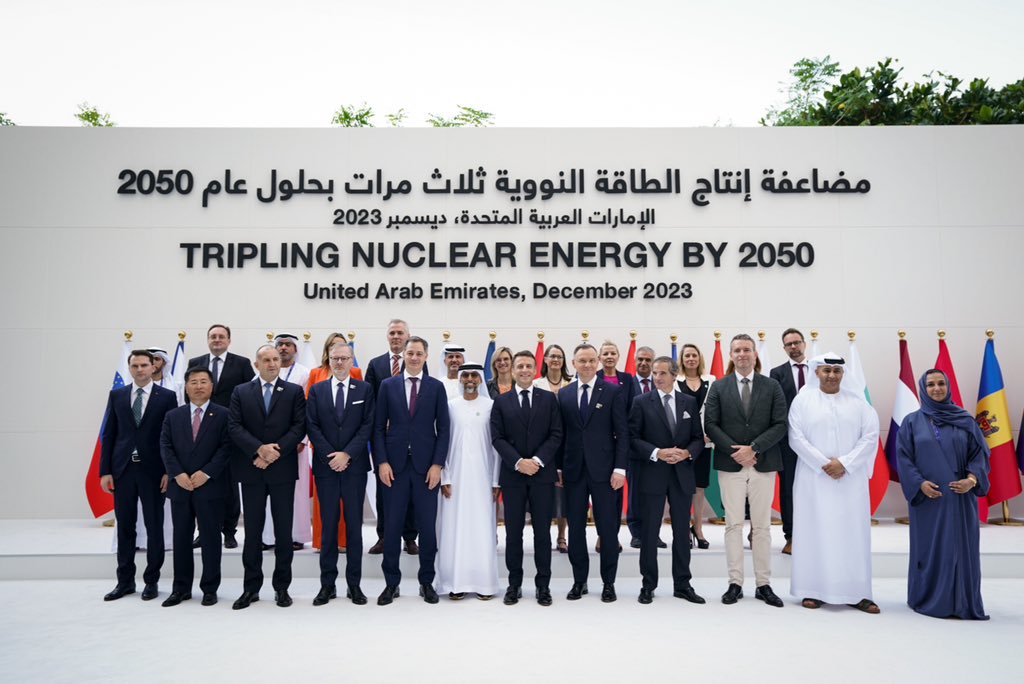The Declaration lays out the importance of nuclear energy as a clean, reliable energy source and the imperative for accelerating the development of nuclear energy in order to meet energy needs…reports Asian Lite News
In an unprecedented gathering in the midst of COP28, leaders from around the world joined in committing to tripling global nuclear capacity by 2050 as part of the transition to net zero.
The Declaration to Triple Nuclear Energy Capacity by 2050 has been endorsed by the Heads of State of nine countries at the ceremony, with declaration endorsement from 21 countries in total, comprising Canada, Czechia, Ghana, Finland, Hungary, Japan, Moldova, Mongolia, Morocco, Netherlands, Poland, Republic of Korea, Romania, Slovakia, Slovenia, Ukraine, United Arab Emirates, the United States of America and the United Kingdom.
The Declaration lays out the importance of nuclear energy as a clean, reliable energy source and the imperative for accelerating the development of nuclear energy in order to meet energy needs, including clean electrons and clean molecules such as steam and hydrogen, as well as process heat, to meet climate goals.
The ceremony took place at the Rove Hotel in front of international dignitaries and industry leaders during COP 28 in Dubai, where the global community are gathering to discuss the actions required to mitigate climate change and ensure global temperatures remain with 1.5 degrees of pre-industrial temperatures. Global energy systems account for around 70 percent of total carbon emissions, with power production generating almost 30 percent of total emissions. Decarbonising electricity, heating, industrial processes and transportation is therefore a crucial driver to reduce emissions.
The Declaration recognises the importance of nuclear energy in achieving global net-zero greenhouse gas emissions, emphasising that nuclear is already the second-largest source of clean, dispatchable baseload power globally, and the largest source of clean electricity for Organisation for Economic Co-operation and Development (OECD) nations. It acknowledges expert analysis from the OECD Nuclear Energy Agency, the World Nuclear Association, the Intergovernmental Panel on Climate Change, and the International Energy Agency (IEA), all of whom conclude the need for significant expansion of nuclear energy capacity to meet emissions reductions goals. The Declaration encourages partnerships, commitments, and innovations from additional governments and financial organisations, including the World Bank, to unleash the political will and resources required for such an expansion.
Government representatives and other leaders who participated in the declaration ceremony were President Emmanuel Macron of France; Sweden’s Prime Minister Ulf Kristersson, Belgium’s Prime Minister Alexander De Croo; President Rumen Radev of Bulgaria; President Klaus Iohannis of Romania; President Andrzej Duda of Poland; Prime Minister of the Czech Republic Prof. Petr Fiala; John Kerry, Special Presidential Envoy for Climate Change, United States of America; Claire Coutinho, Secretary of State for Energy Security and Net Zero, United Kingdom; Kang Kyung-sung, Vice Minister, Ministry of Trade, Industry, and Energy, Republic of Korea; Rafael Mariano Grossi, Director General, International Atomic Energy Agency; Mohamed Al Hammadi, President of the World Association of Nuclear Operators and Chair-Elect of the World Nuclear Association; among others.
Suhail Al Mazrouei, Minister of Energy and Infrastructure, UAE, said, “Nuclear energy offers a clean, stable baseload energy source. The UAE took the decision back in 2009 to pursue this important energy source and today, it is decarbonising energy-intensive and heavy industry across the country. We see nuclear as part of a balanced portfolio of energy, and we are committed to working with other countries to show how we have delivered this in a safe and sustainable way. The UAE supports this important declaration, which is crucial for reaching Net Zero.”
The UAE has been leading the way in the global clean energy transition. Over the past five years, the UAE has added the most clean electricity per capita of any country globally. 75 percent of that electricity has come from nuclear energy, with the Barakah Nuclear Energy Plant in Abu Dhabi commencing commercial operations of its first unit in 2021, adding 10TWh of electricity to the grid each year as each 1400MW unit of the four-unit plant has come on line. Unit 4 of the plant is set to come online in 2024.
Mohamed Al Hammadi, Managing Director and CEO, Emirates Nuclear Energy Corporation, said, “This declaration symbolises nuclear’s importance to achieving Net Zero by 2050. More importantly, this declaration brings a message of hope to young people. They are counting on us to make the right decisions today as we work to accelerate the decarbonisation of our energy systems.
The fact that 22 nations have gathered here in the United Arab Emirates to launch this declaration is remarkable. It is a clear and crisp message that nuclear is a big part of the solution and needs to be as supported as other clean sources. The nuclear energy industry is surging ahead through innovation in clean electron and molecule generation. By decarbonising our grid, we accelerate the decarbonisation of hard-to-abate sectors.”
The UAE’s addition of nuclear energy as part of its energy portfolio underscores the nation’s strategy to create a secure and sustainable energy mix to drive its net-zero economy and its commitments to achieve Net Zero by 2050.

Leave a Reply